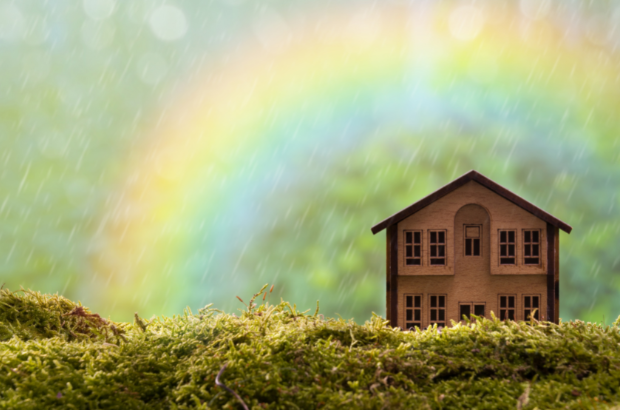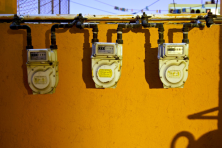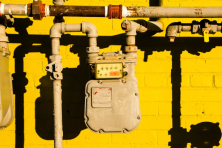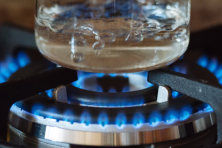Oregonians deserve healthy, affordable, resilient buildings that run on clean energy. Right now, too many of our homes and workplaces fail to protect us from the harms of climate change, like extreme heat and wildfire smoke. The way we heat buildings and water with fossil fuels is making things worse, especially for lower-income and frontline communities. A suite of policies emerging from the legislature’s Resilient Efficient Buildings Task Force will help reduce climate and air pollution from Oregon’s buildings while increasing energy efficiency, affordability, and resilience and creating good jobs.
|
Resilient, Efficient Buildings Policy Package |
|||
The problem:
Buildings are Oregon’s second largest and growing source of climate pollution, which is driving extreme heat, wildfire smoke, and air pollution that is threatening the lives and livelihoods of Oregonians. Meanwhile, the cost of using fossil fuels to heat and cook is rising. Without near-term policy action, we risk leaving the most vulnerable Oregonians — renters and low-income, BIPOC, and rural communities — with even more expensive energy bills and without access to healthy, resilient, and affordable homes.
The opportunity:
Energy-efficient and resilient buildings that run on clean energy can lower household and businesses’ energy bills and protect people from climate harms. With the recent passage of the federal Inflation Reduction Act, states like Oregon have a short window of opportunity to leverage significant investment in clean, resilient, and healthy buildings for all, while reducing climate and air pollution.
Resilient, Efficient Buildings Policy Package
Climate Solutions and the Building Resilience Coalition are gearing up for a major legislative hearing on the “Resilient Buildings” policy package, and we need your help in sending a clear message to policymakers: the time for healthy, affordable, resilient homes and buildings is NOW!
Click Here to Submit Written Testimony
This form is managed by our friends at the Building Resilience Coalition, of which Climate Solutions is a founding member.
By supporting an ambitious Resilient, Efficient Buildings package, we will:
- Drive down the cost of living for Oregon families through improved energy affordability
- Slash climate pollution from the second-largest source of emissions in Oregon
- Attract and leverage unprecedented federal investments into meaningful benefits for Oregon communities, workers, and local economies
- Ensure schools and homes are safer and healthier for students, residents, and workers
- Create family-sustaining jobs for workers, including electricians, HVAC installers, carpenters, plumbers, and construction workers
- Protect public health by improving indoor air quality and resilience to climate hazards
|
Build Smart from the Start New homes and buildings must be prepared to protect us from the climate crisis and help us save on energy bills. Our communities are growing rapidly and housing is in high demand. Constructing clean, efficient, resilient buildings will be a continuous need and a big job creator. Approximately a third of buildings that will exist in Oregon in 2050 have yet to be built, and most last for 50-100 years. Improving our state’s base building code can ensure that new construction and major renovations reduce both climate footprint of materials and operational energy waste. This will save families and businesses money on utility bills while maximizing benefits for low-income communities, renters, rural and BIPOC communities. |
Healthy Heating and Cooling for All Heat pumps are the most efficient heating and cooling technology available. Coupled with heat pump hot water heaters and weatherization, installing these efficient appliances can cut energy waste and household energy bills significantly. Strengthening our state’s energy-efficiency programs for existing homes and buildings, and streamlining efforts to distribute heat pumps to the communities that need them most will be critical to leveraging unprecedented federal funding from the Inflation Reduction Act, which includes billions of dollars in incentives and rebates for households to install efficient, all-electric appliances. |
|
Building Performance Standard Cutting energy waste from some of our state’s largest and most energy-intensive buildings can lower energy bills and significantly cut air and climate pollution. A Building Performance Standard for existing buildings would establish specific performance levels that buildings must achieve over time, and can be designed to target improvements in a variety of building aspects, including energy use, water use, and emissions. |
Smart State Buildings State and local governments have an important role to play in the transition to healthy, resilient buildings powered by clean energy, and can lead by example by adopting policies to improve the energy efficiency of and reduce pollution from state-owned and publicly-financed buildings. This is especially important when it comes to improving air quality and reducing energy costs in public schools. |




